China
About Andrew Cusack
 Writer, web designer, etc.; born in New York; educated in Argentina, Scotland, and South Africa; now based in London.
Writer, web designer, etc.; born in New York; educated in Argentina, Scotland, and South Africa; now based in London. read more
News
Blogs
Reviews & Periodicals
Arts & Design
World
France
Mitteleuropa
Knickerbockers
Argentina
The Levant
Africa
Cape of Good Hope
Netherlands
Scandinavia
Québec
India
Muscovy
Germany
Academica
The Situation in the Far East
A century-old geopolitical cartoon is updated for today
Tse Tsan-tai — or 謝纘泰 if you fancy — was by any standard a remarkable man. Born in New South Wales, this Chinese-Australian Christian was a colonial bureaucrat, nationalist revolutionary, constitutional monarchist, pioneer of airship theory, and co-founded the South China Morning Post — still one of the most prominent newspapers in the Orient.
Tse’s most important visual contribution was a widely distributed political cartoon usually known in English as ‘The Situation in the Far East’ or in Chinese as the ‘Picture of Current Times’ (below).
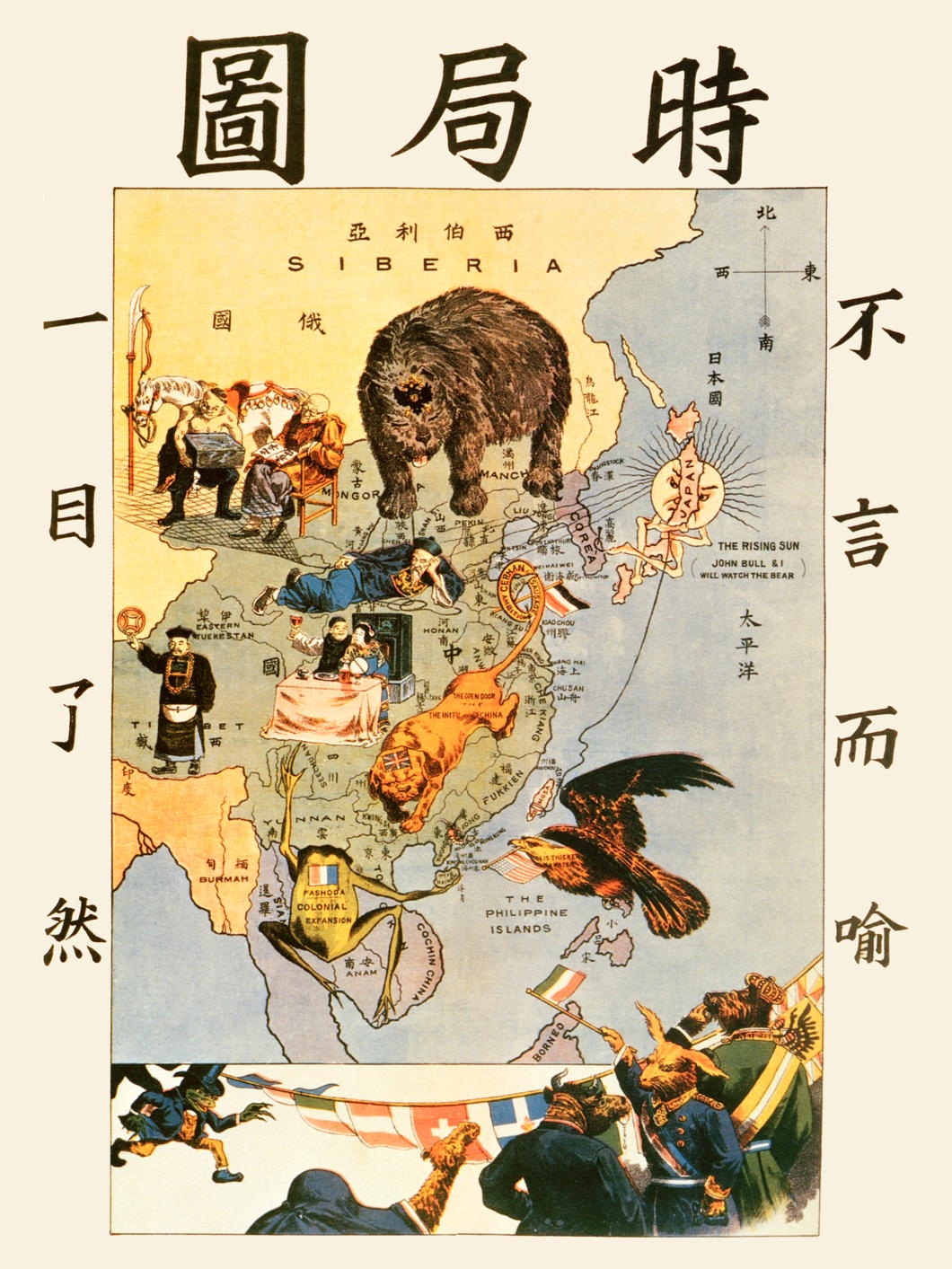
Crafted as a propaganda measure to warn his fellow Chinese of the designs of foreign powers, the cartoon depicts the perils facing the Middle Kingdom.
Japan, with its expanding navy, proclaims it will watch the seas with its ally, Great Britain. The Russian bear looms from Siberia, crossing the border into China. A British lion sprawls over the land, its tail tied up by the “German Sausage Ambitions” at Tsingtao. The French frog guards Indochina while the American eagle lurks from the Philippines.
Meanwhile, the Chinese figures show sleeping bureaucrats and carousing intelligentsia unresponsive to the external threats.
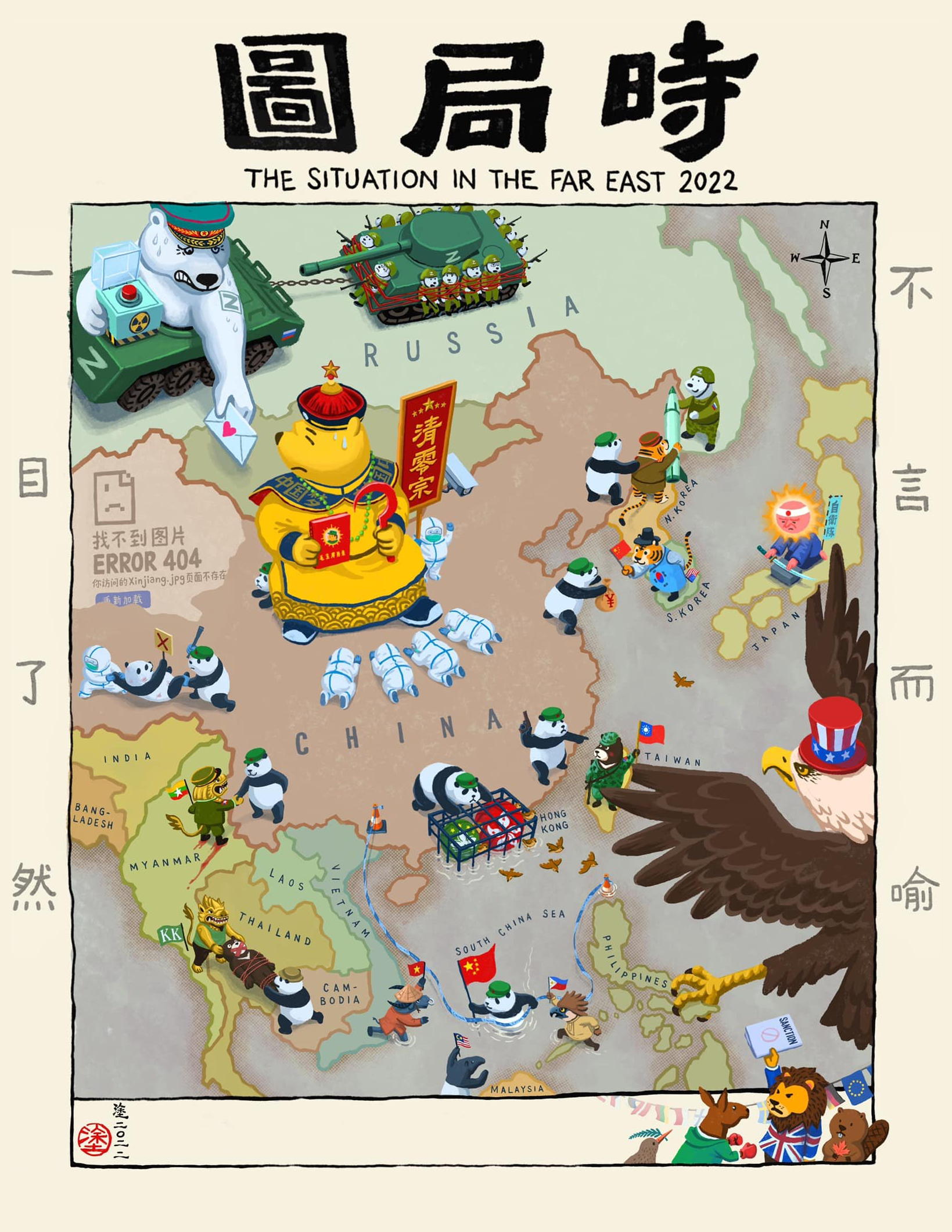
Now the exiled Hong Kong artist Ah To (阿塗) has updated ‘Situation’ to reflect the realities of 2022. (more…)
Master Mitsui’s Ink Garden
Daniel Mitsui is one of the most interesting artists out there, exhibiting a wide range of influences from the Celtic to the Oriental. Among his latest works is an ink drawing on a Catholic theme. As Daniel explains:
I received a commission to create a Catholic religious drawing in a Chinese style. These explorations into artistic traditions outside of European Christendom are always exciting, and China was new territory for me. When developing the concept for the project, I looked to one of the early missionaries to China, the Italian Jesuit Matteo Ricci.
Some time in the very early 17th century, Ricci gifted four European prints to the Chinese publisher Cheng Dayue: two engravings by Anthony Wierix from a series illustrating the Passion and Resurrection of Christ, another by the same artist reproducing the painting of the Virgin of Antigua in Seville Cathedral, and one by Crispin De Pas the Elder from a series illustrating the life of Lot.
Master Cheng copied these images into his Ink Garden, a model book of illustrations and calligraphy. The missionary saw this as a good opportunity to disseminate lessons in Christian doctrine and morality among the Chinese population.
Continue reading here.
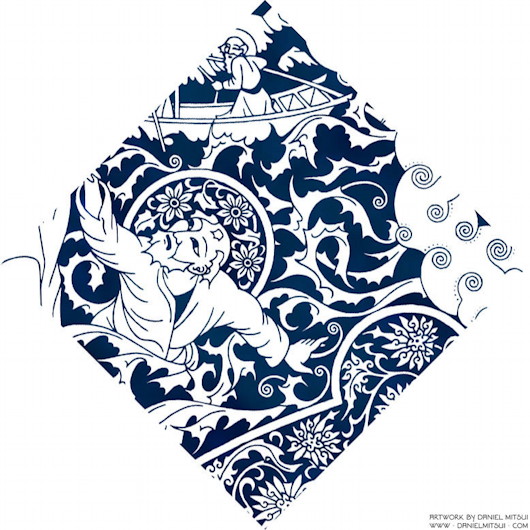
Mullen, the Times, and Christianity in China
The Rev’d Peter Mullen on top form:
[T]here has been a great deal of press conjecture about the reasons behind the rapid growth of Christianity in China – one item in particular in that frivolous girls’ magazine called The Times. Could it be, as the airhead bimbo who wrote the piece opined, a result of the progress of capitalism in China? Or might it have something to do with the Hegelian dialectic? You could be tempted by her baroque phraseology to take her half-seriously: until you realise with a shudder that this is the same Madchen who writes The Times‘ regular columns on knicker elastic and of who’s going up and down in the celebrity ratings.
Perhaps – I don’t know, but perhaps – the rapid rise of Christianity in China has something to do with its appeal to hearts and minds: to the intuition that this thing called the Christian faith has the ring of truth about it? It doesn’t sound, on the face of it, to be an implausible thought with which to start.
Towards a Confucian Modernity
MY RESPONSE TO Samuel Huntington’s coming clash of civilizations concerns the desirability and necessity of a dialogue of civilizations. Hegel, Marx, and Max Weber shared an ethos that, despite all its shortcomings, the modern West informed by the Enlightenment mentality was the only arena where the true difference for the rest of the world would be made. Confucian East Asia, Islamic Middle East, Hindu India, or Buddhist Southeast Asia were on the receiving end of this process. Eventually, modernization with homogenization or convergence will make cultural diversity inoperative if not totally meaningless. It was inconceivable that Confucianism, or, for that matter, any other non-Western spiritual tradition, could exert a shaping influence on the modernizing process. The development from tradition to modernity was irreversible and inevitable. In the global context, some of the most brilliant minds in the modern West assumed this to be self evidently true, but nowadays it has turned out to be only part of the big picture. In the rest of the world, and arguably in Western Europe and North America, the anticipated clear transition from tradition to modernity never occurred. As a norm, traditions continue to make their presence in modernity, and indeed the modernizing process itself is constantly shaped by a variety of cultural forms rooted in distinct traditions. The eighteenth century recognition of the relevance of radical otherness to one’s own self-understanding seems more applicable to the current situation in the global community than the attention to any challenges to the modern Western mindset of the nineteenth century and the first half of the twentieth century. (more…)
Olympic Teams of Yesteryear
The vanished lands and failed alliances of the Modern Olympiad
THE GAMES OF THE Modern Olympiad are events which are meant to bring the peoples of the world together in peace and harmony and all those good and heartening things, but from the very beginning they have gotten bogged down in the petty particularities of rival nations, which altogether makes them rather more fun and interesting, if perhaps a touch less high-minded. The story of the ancient gathering’s revival in 1896 through the efforts of Pierre Frédy, Baron de Coubertin is well-known. Athletes from at least fourteen countries participated in those first modern games in Athens over a century ago, though the concept of national teams was not introduced until the 1906 games (the Intercalated Games, which have since been de-recognised by the IOC). But since those first games towards the end of the nineteenth century, the fortunes of many lands have waxed and waned, and likewise the spirit of unity amongst various peoples vied with the spirit of distinctiveness. Here, then, are but a small sample of Olympic teams which once vied for gold but which can no longer be found among the Olympic competitors of today. (more…)
Interesting Things Elsewhere
This determined Celt is gunning for Thabo
Kevin Bloom | The Daily Maverick
Ireland’s 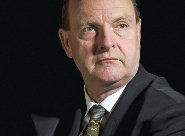 Paul O’Sullivan took over as head of security at South Africa’s airport authority in 2001, and discovered something was wrong from the start: why didn’t the policeman on duty want to take a statement about the attempted theft of his baggage? Since then, his life has been a series of bizarre events leading him ever deeper into the most complex criminal network of the post-apartheid era, including the recent the trial and conviction of former national police chief Jackie Selebi. But O’Sullivan’s determined quest to expose crookedness isn’t over yet, and he now has former president Thabo Mbeki in his sights. read more
Paul O’Sullivan took over as head of security at South Africa’s airport authority in 2001, and discovered something was wrong from the start: why didn’t the policeman on duty want to take a statement about the attempted theft of his baggage? Since then, his life has been a series of bizarre events leading him ever deeper into the most complex criminal network of the post-apartheid era, including the recent the trial and conviction of former national police chief Jackie Selebi. But O’Sullivan’s determined quest to expose crookedness isn’t over yet, and he now has former president Thabo Mbeki in his sights. read more
The apparatus of state will simply ignore the government
‘Inspector Gadget’ | Police Inspector Blog
Police across England were told by the responsible minister of the democratically elected government that they must not chase performance targets any longer. “I can also announce today that I am also scrapping the confidence target,” said the Home Secretary, Theresa May, “and the policing pledge with immediate effect”. But the ‘senior management team’ of the West Yorkshire Police have stated they will go on no matter what the government says. read more
Has Christian Democracy reached a dead end?
Jan-Werner Mueller | Guardian.co.uk
The commentator completes a brief survey of the struggles of Christian Democracy in Germany and Europe today. The French leader Georges Bidault claimed that Christian Democracy meant “to govern in the centre, and pursue, by the methods of the right, the policies of the left”. But Christian Democracy’s brief French moment in the 1950s didn’t survive the return of de Gaulle, and Christian Democratic parties on the continent today face an existential crisis. read more
Also: Monsignor Ignacio Barreiro’s talk at the Roman Forum’s 2010 Summer Symposium, entitled The Problem of Christian Democracy will be made available online in audio form sometime in the coming months.
Deep in Shanxi, the most Catholic village in China
Anthony E. Clark | Ignatius Insight
Church after church dot the landscape and high steeples rise above small villages as they do in southern France. Passing through a narrow side road one arrives and is welcomed by three great statues at the village entrance: St. Peter holding his keys is flanked by Saints Simon and Paul. Thirty minutes before Mass the village loudspeakers, once airing the revolutionary voice of Mao and Party slogans, now broadcasts the rosary. Welcome to Liuhecun, the most Catholic village in China. read more
Look for me in the Cotswolds.
Dino Marcantonio
The apologists for modernist architecture have tried for a century to gain public acceptance of and appreciation for their horrors. While the elites have almost overwhelmingly been converted, the general populace around the world still sees that the Emperor has no clothes, and almost always prefers architecture that reflects the tried and true, the local and the natural. Alain de Botton, the Swiss essayist, ‘pop philosopher’, and former ‘writer-in-residence’ at Heathrow Airport, is the latest to give it a go, this time in the pages of the modernist Architectural Record. Dino Marcantonio provides a most useful fisking. read more
Canada is a French country
Andrew Coyne | Maclean’s
At the recent Canada Day celebrations on Parliament Hill, Canadian PM Stephen Harper spoke of “the steadfast determination and continental ambition of our French pioneers, who were the first to call themselves ‘Canadians.’” At other times he has spoken of Canada as having been “born in French,” of French as “Canada’s first language,” and, most famously, of Quebec City as “Canada’s first city,” its founding in 1608 as marking “the founding of the Canadian state.” While the sentiment may seen anodyne, moreover, the implications are radical. read more
The Prime Minister of China who became a Benedictine Abbot
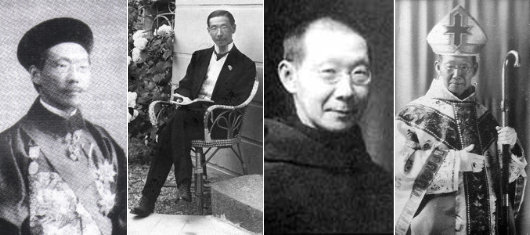
CHRISTIANITY HAS A LONG and varied history in China stretching over at least one-and-a-half millenia. The ancient country has even had Christian leaders, such as the Congregationalist founder of the Chinese Republic, Sun Yat-sen, and his Methodist successor, Gen. Chiang Kai-shek (head of the Kuomintang for nearly forty years). Still, until I read this fascinating story in the Catholic Herald I had no idea that there was a Prime Minister of China, Lou Tseng-tsiang (陸徵祥), who ended his days as a Benedictine monk by the name of Dom Pierre-Célestin. Lou was born a Protestant in Shanghai in 1871, but married a Belgian woman and eventually converted to Catholicism. Serving his country in the diplomatic arena, he accomplished extensive reforms of the Ministry of Foreign Affairs, avoided becoming part of any of the various factions that divided the government, and was one of the founding members of the Chinese Society of International Law. Lou bravely stood up to the indignities imposed upon China through the 1919 Treaty of Versailles by refusing to sign the shameful document which sewed the seeds of future disaster.
Xu Jingcheng, Lou’s mentor and sometime Ambassador to the Court of the Tsars in St. Petersburg, instructed the up-and-coming diplomat that “Europe’s strength is found not in her armaments, nor in her knowledge — it is found in her religion. … Observe the Christian faith. When you have grasped its heart and its strength, take them and give them to China.”
After the death of his wife, Lou became a Benedictine monk at the abbey of Sint-Andries in Flanders, and was eventually ordained a priest in 1935. A decade later, Pope Pius XII — who cared deeply for the Church in China and finally settled the long-standing dispute over Chinese ancestor-honouring rituals in favour of the practices — appointed him titular abbot of the Abbey of St. Peter in Ghent. Sadly, the Chinese Civil War prevented Dom Pierre-Célestin from returning to China, and he died in Flanders in 1949.
The words of Lou’s mentor that Europe’s strength is her faith found recent confirmation from Professor Zhao Xiao, a prominent Chinese economist at the University of Science & Technology Beijing. Prof. Zhao, a member of the Chinese Communist Party, began studying the differences between the economies of Christian societies and those of non-Christian societies. As a result of his investigations, he argued that Christianity would provide a “common moral foundation” for China that would help the economy by reducing corruption, narrowing the gap between rich and poor, preventing pollution, and promoting philanthropy.
“A good business ethic or business morality,” Prof. Zhao says, “can provide for a type of motivation that transcends profit seeking. Why do people want to do business? The main goal would be to earn money. The purpose of a company is to maximize profits. But this can cause companies to look for quick results and nearsighted benefits. It can cause companies to disregard the means and earn money at the expense of destroying the environment, society and the livelihood of others, or endangering the entire competitive environment of the trade.”
“If my motivation for doing business is the glory of God, there is a motivation that transcends profits. I cannot go and use evil methods. If I used some evil methods to enlarge the company, to earn money, then this is not bringing glory to God. Therefore, this is to say that it [bringing glory to God] can provide a transcendent motivation for business. And this kind of transcendental motivation not only benefits an entrepreneur by making his business conduct proper but it can also benefit the entrepreneur’s continued innovation.” (more…)
The Church in China
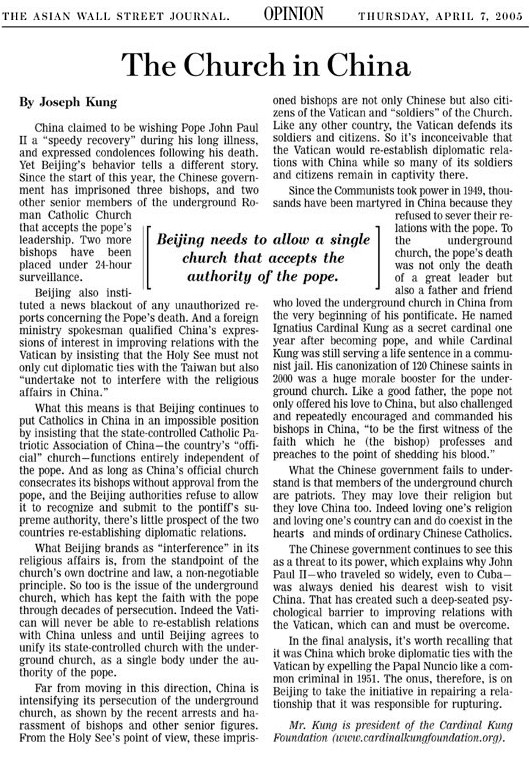
C.f. the Cardinal Kung Foundation.
Search
Instagram: @andcusack
Click here for my Instagram photos.Most Recent Posts
- Telephone Kiosk No. 2 May 15, 2024
- The last of its vintage May 15, 2024
- Letters Patent May 8, 2024
- Bicycle Rack April 29, 2024
- Burns Tower April 19, 2024
Most Recent Comments
Book Wishlist
Monthly Archives
Categories


